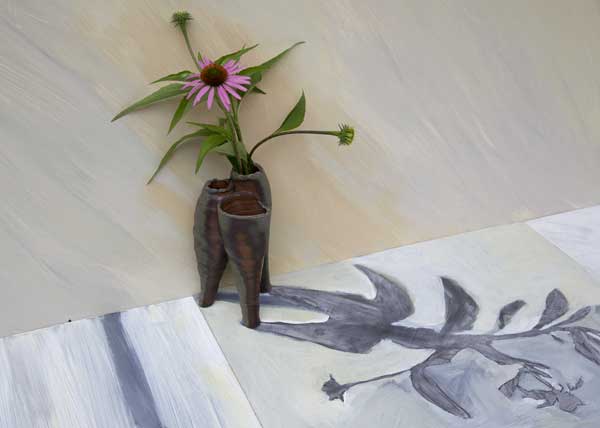The shed that holds our gas kiln is a multi-use space. It's where we mix clay or set out the pots when stacking the kiln. In-between any task it becomes the spot where cardboard boxes and packing materials accumulate. Today was a day of shifting tides. The clay mixer got put away; the trough we use to mix the dry materials becomes a table. The floor is swept, all surfaces cleared, and it feels like a low tide where a sandy beach has been exposed. Clean up is not a favorite part of the creative process but a productive one. I find tools that have been missing, test tiles from the last firing. My mother always used to send me postcards when she was cleaning. She would find images of pots she thought I'd like or quotes she found inspirational. The repetition of cleaning is part of an imprecise cycle. The tiles are gathered and put in a box out of sight with the knowledge that with time my perspective on their value will shift.
 "Nor is the tide itself really much to count on. Repetition is rarely the exact science we imagine. The mathematics of the tide are imprecise, its rise and fall influenced by the angle of the sea bed, the depth of a channel or width of the bay at its mouth. It's good to be reminded of this--that every time we think we can measure the world, know its shape or how it moves, some new dimension is presented to us to throw our calculations off." The Ecology of Uncertainty, Akiko Busch
"Nor is the tide itself really much to count on. Repetition is rarely the exact science we imagine. The mathematics of the tide are imprecise, its rise and fall influenced by the angle of the sea bed, the depth of a channel or width of the bay at its mouth. It's good to be reminded of this--that every time we think we can measure the world, know its shape or how it moves, some new dimension is presented to us to throw our calculations off." The Ecology of Uncertainty, Akiko Busch
 "Nor is the tide itself really much to count on. Repetition is rarely the exact science we imagine. The mathematics of the tide are imprecise, its rise and fall influenced by the angle of the sea bed, the depth of a channel or width of the bay at its mouth. It's good to be reminded of this--that every time we think we can measure the world, know its shape or how it moves, some new dimension is presented to us to throw our calculations off." The Ecology of Uncertainty, Akiko Busch
"Nor is the tide itself really much to count on. Repetition is rarely the exact science we imagine. The mathematics of the tide are imprecise, its rise and fall influenced by the angle of the sea bed, the depth of a channel or width of the bay at its mouth. It's good to be reminded of this--that every time we think we can measure the world, know its shape or how it moves, some new dimension is presented to us to throw our calculations off." The Ecology of Uncertainty, Akiko Busch
Leave a comment